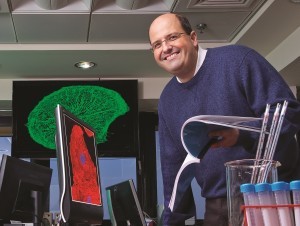A Biological Pacemaker
Canadian-Israeli Development: A New Biological Pacemaker
HAIFA, ISRAEL (December 19, 2016) – Using a type of cardiac cells known as sinotrial (SA) node pacemaker cells, a team of scientists from Israel and Canada have developed a biological pacemaker that overcomes many of the limitations of electrical pacemakers. The breakthrough findings could pave the way for an “assembly line” for an unlimited reservoir of pacemaker cells to treat patients with heart rhythm problems.
The findings by the research group that included Professor Lior Gepstein of the Technion Faculty of Medicine and Rambam Heath Care Campus, were published last week in Nature Biotechnology.
The sinotrial (SA) node is the natural pacemaker of the heart, and is comprised of a group of dedicated heart cells – SA node pacemaker cells – responsible for initiation of the electrical signal leading to the contraction of the heart. A dysfunction in their activity results in slow beating rate that could disrupt cardiac function and lead to weakness, dizziness, fainting, heart failure, and even death. Such dysfunction required the implantation of an artificial electronic pacemaker to correct the dysfunction of the natural pacemaker mechanism using electrodes inserted into various areas of the heart.
But such electrical pacemakers have a myriad of limitations, including an invasive surgical procedure, danger of infection, a lack of hormonal sensitivity and a limited duration of activity (due to limited battery life). And when it comes to treating children, whose hearts are still growing, an electrical pacemaker does not adapt itself to the gradual increase in cardiac volume.
One of the most promising future alternatives to electrical pacemakers is the biological pacemaker strategy, based on the use of cells that are functionally similar to natural pacemaker cells. The team from the Technion, Rambam, and the University Health Network’s McEwen Centre for Regenerative Medicine used knowledge learned in the field of developmental biology to develop a differentiation protocol for the creation of pacemaker cells from human embryonic stem cells.
“The pacemaker generated from embryonic stem cells exhibits the molecular, electrical and functional properties characteristic of human pacemaker cells,” said Prof. Gepstein. “It is an effective and promising alternative to natural pacemaker cells in the event of their dysfunction. This development is significant both in terms of research – because it will enable scientists to study the heart in new ways, and in practical terms – since we are presenting an ‘assembly line’ here for an unlimited reservoir of pacemaker cells to treat patients with heart rhythm problems.”
To demonstrate the potential future clinical use of the cells as biological pacemakers, experiments were conducted in the Gepstein laboratory on rats. Pacemaker cell transplants restored normal heart rhythm in 6 of the 7 rats that were tested.
“We have previously demonstrated the concept of biological pacemakers, but until now the cells we used contained a mixture of pacemaker cells with other heart cells,” said Prof. Gepstein. “Together with our Canadian partners, we present a method for producing a population of pure pacemaker cells and, and give proof that they work well as a substitute for natural pacemaker cells that have been damaged.”
The study was led by Prof. Gordon M. Keller from the McEwen Centre for Regenerative Medicine and also included collaboration with Dr. Peter Backx, senior scientist at the Peter Munk Cardiac Centre, both from the University Health Network in Toronto.
Prof. Gepstein, faculty member at the Rappaport Faculty of Medicine at the Technion, is the Director of the Cardiology Department at Rambam Heath Care Campus. He is an internationally renowned expert in the field of stem cells, particularly the use of stem cells to repair heart defects. One of his latest studies, which presented a new approach to the treatment of abnormal heart rhythm by means of light, was published earlier this year in the same journal (Nature Biotechnology).
The study was conducted within the framework of cooperation between the Technion and the Canadian University Health Network (UHN), which is headquartered in Toronto. Some three years ago, the two bodies established an international center for innovation in cardiovascular research aimed at developing new ways to treat heart disease. Prof. Lior Gepstein led the initiative for the Israeli side.
Link to the article in Nature Biotechnology
Click here for a video demonstrating the effectiveness of the biological pacemaker developed by the group



